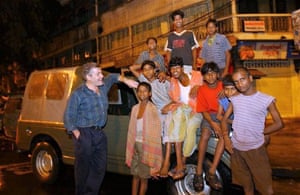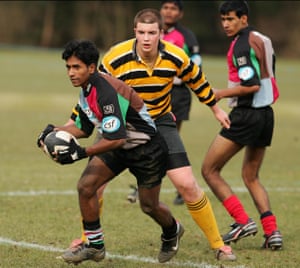The rugby club in Kolkata that has given hope to 3,500 street children | Sport
Thirty-three years ago, Tim Grandage arrived in Kolkata to manage the city’s HSBC bank. The Englishman had volunteered for the position, much to the surprise of his human resources manager. Kolkata did not have the best reputation at the time, but Grandage fell in love with the city immediately and was drawn to the warmth and hospitality of its citizens.
“Of course, I knew about poverty in Kolkata, but it was absolutely brilliant to be there,” he says. “It was an absolutely crazy and vibrant city, like nothing I had ever seen before or since. With India, or certainly Kolkata, you either love it, or you hate it. For me, it was love instantly. The people in the city were delightful. No matter where you were from, they wanted to welcome you to their city. They consistently went out of their way to help you.”
Grandage spent his early months working hard at the bank and often returned to his apartment late. One night his car was surrounded by people who slept on the streets. “There were women and children all around the car, but they weren’t aggressive. They were worried about my car. You see, if the car was stolen and it was reported to the police, they said they would be blamed. They offered to look after it for me. I thought they wanted money, but they never asked for anything. Not once.”

When Grandage noticed that one of the boys who usually looked out for his car for not there, he asked his friends where he had gone. They said he was sick. “I found him on the street with an incredibly high fever,” says Grandage. “I wasn’t long in the bank, so I look through my clients and found a doctor who was a senior orthopaedic surgeon. When I rang him, he was so relieved that I wasn’t talking about his overdraft! The doctor helped the boy and, a few days later, the boy returned to his waiting room. The doctor demanded to know what the boy wanted. The boy told him he wanted to thank him. The doctor had the wind knocked out of his sails. He told me, in 40 years working as a surgeon, a patient had never thanked him.”
From that moment on, in his smart banker’s suit and tie, Grandage would gather sick children from the streets and bring them to the doctor for treatment. He knew he needed to find somewhere safe for the children to sleep, as their illnesses would return quickly, so eventually resigned from HSBC to set up Future Hope, a charity for the most vulnerable children on the streets of the city. The bank understood his decision and did their bit to help by providing an apartment to lodge the children.
Grandage hoped he and some volunteers could give the children an education, but found the kids had no wish to sit in a classroom and learn from textbooks. He decided he would use rugby as a way in. Street children were not usually welcome on the manicured lawns of the Calcutta Cricket and Football Club – the club whose history dates back to 1792 and takes in the establishment of the Calcutta Cup – but Grandage used his connections to gain them entry. After watching their first game of rugby, the children returned to the apartment pleading with him to teach them the game.
“I tried to start them with touch rugby, but they were pleading with me: ‘Uncle, we want to play real rugby.’ They hated touch. They wanted full contact and to play the game properly. Immediately, we realised that rugby was a great leveller and that its physical nature created self-discipline. It doesn’t matter who you are, on the rugby field you are entirely equal. Your background does not matter. We then went into the classroom to learn the theory of rugby and, for the very first time, they were utterly engaged.”
Future Hope set up their own team and entered the historic Calcutta Cup. They won the competition for the first time in 1996, beating the Kolkata Police in the final. Many of the children had known the police in less happy circumstances on the street; now they were beating them on the rugby field. After the final, Grandage received a phone call from the police commissioner while the boys were having a celebratory meal in the city’s Chinatown.

“The commissioner was so impressed with the boys, that he rang me to ask me to send some of them down to coach the police. I asked one of the boys, Mintu, to go down and instructed him to be very serious about it. He came back roaring with laughter. I said: What’s the matter? I told you to take it seriously.’ Mintu, who had been living on the streets before Future Hope, just couldn’t get over the police all calling him ‘Sir’ when he was coaching them.”
In 1999, Grandage set up Future Hope’s first school. Today, the pupils are able to be educated up to year 12 with a full academic curriculum conducted in English, and many pupils go on to university. More recently, Future Hope has also set up a training centre to provide vocational skills to help pupils to find employment after their time at the school.

Rugby continues to be an extremely popular sport in the school, for boys and girls. Future Hope have a long partnership with Harlequins and proudly play in the London club’s strip. Adidas made Future Hope their own bespoke jersey and they have received visits from players such as Mark Lambert and Will Skinner, who dedicated time to coaching up to 800 children.
“The impact of the Harlequins on the children is quite unbelievable,” says Grandage. “The children just look up to them as heroes, for their skill and dedication to their sport. Mark [Lambert] has been out five or six times and the children just love him. He was meant to come out with eight other Harlequins in June but unfortunately that won’t happen for a while now. The connection the children have with the club is a marvellous thing for them.”
Grandage determination in setting up Future Hope is mirrored on the rugby field. He has been playing for 52 years and still turns out for Future Hope in the original Calcutta Cup. Future Hope continue to enjoy a competitive rivalries with former adversaries the Kolkata Police and historic clubs such as Calcutta Cricket and Football Club. Future Hope pupils also train in the city’s rowing clubs, once the preserve of the upper classes. Their girls’ football team also became Kolkata champions last year.
In all, the charity has helped 3,500 children in the last 33 years. Grandage’s ambition now is to build a school that can house and educate 500 children. As always, sport will be at the centre. Future Hope started with a ragtag rugby team of former street kids who took on the authorities they once hated and gained their respect. Today, Future Hope graduates are in positions of power across the world and they give back to the school. In the chaos and cacophony of Kolkata, Grandage created a school that perfectly mirrors the vitality of the city he loves.
Jonathan Drennan is on Twitter and you can read his interviews here.
